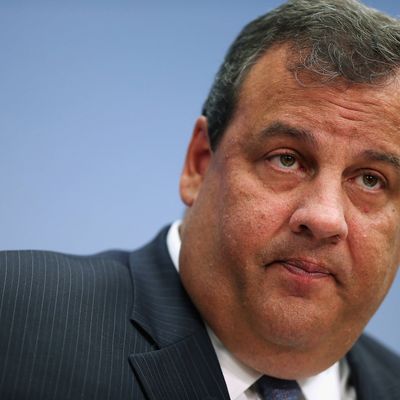
There’s a fair amount of Schadenfreude this week among the New Jersey press corps, as they wait for the other shoe to drop in Chris Christie’s Bridgegate scandal and wonder if it’s Michael Drewniak, Christie’s press secretary and his “id,” as one official calls him. Drewniak is on the hot seat after it emerged last week that he got dinner with former Port Authority official and Christie friend David Wildstein two days before Wildstein resigned. “If Drewniak can’t explain what he did at dinner with David, he’s going to be gone, because the press corps in New Jersey hates him with a passion,” says a Democratic strategist. “If you put him on the train to D.C. this week and turned the lights off it would be like Murder on the Orient Express — he’d have 50 slashes in him. You can only be a jackass for so long before everyone wants to knife you.”
As a reporter, it’s hard not to feel your stomach turn while sifting through the documents released from Governor Chris Christie’s office last week, as Drewniak brushes off reporters’ inquiries about the closures (“Fuck him and the S-L [Star Ledger],” he wrote, and then called a reporter “a fucking mutt”). Christie’s office wasn’t always this way: When he was nominated to be U.S. Attorney by George W. Bush in 2001, remaining in the job until he became governor, he was adept at befriending reporters.
But as governor, that changed. “He became like an angry dictator toward the press,” says a former Corzine aide. “The reporters who did his bidding, he’d reward, and the ones who asked hard questions, he’d call morons and idiots, and stick Drewniak, a vulgar guy with serious anger issues and no impulse control, on him. Drewniak is Mr. No to reporters he doesn’t like. He just chokes off access to documents — ‘You want to see this? No.’” Christie stopped calling on reporters he didn’t like, like Ginger Gibson at Politico, and is well known for calling one an idiot and screaming at another about being “the thinnest-skinned guy in America.”
In August 2009, Zack Fink, currently the statehouse reporter for NY1 but then a reporter for New Jersey Network, the PBS channel in New Jersey, developed a source who told him about a $46,000 loan that Christie had given Michele Brown, a subordinate that he’d promoted in the U.S. Attorney’s office, to pay her mortgage. This raised questions immediately about Christie’s ties to the U.S. Attorney’s office while he was running for governor, and was followed by a string of terrible press for Christie, including a story in the New York Times that said he didn’t report the income from the loan on his personal financial disclosure forms. (Brown was eventually forced to resigned, though Christie rehired her when he became governor — something that is perceived as a middle finger to those who revealed their relationship.)
“When Zack Fink broke the story about the undisclosed loan that Christie had made to Michele Brown, it was without a doubt the most important story of the 2009 race,” says Lis Smith, who was a press secretary for Corzine during the campaign. “Corzine was down double digits in the polls then. None of our campaign’s attacks were gaining any traction. Once Zack wrote that story it opened the floodgate to a whole new range of stories that hadn’t been out there before — how Christie ran the U.S. Attorney’s office, how Michele was using the attorney’s office to benefit Christie’s campaign, even a traffic incident with Christie and Brown where Christie acted in an abusive and vindictive manner.”
In 2011, Christie announced in his budget address that he was going to shut down NJN. He wasn’t the first person to suggest ending a publicly funded entity like state TV: Corzine had suggested making it a nonprofit, much as Giuliani did with WNYC, which now has a good endowment and is a model across the nation. But “the conventional wisdom when Christie pulled the plug was he’d done it because they had done the toughest reporting on him during the 2009 campaign,” says Smith. “Had NJN not blown the story open with the story about undisclosed loans, many other stories could very well have never come out — stories that illustrated what we known now, which is Christie is someone who has always used the power of his office to vindictive ends and has played fast and loose for years.”
At the time, it sounded far-fetched that a governor would care so much about being burned by state television that he’d shut it down. But then again, with the news last week, anything seems possible. “Whether it’s reporters or local leaders, Christie does not fly at 35,000 feet — he is a bare-knuckled street brawler in the trenches, and no fight is too small,” says a reporter who has covered Christie. Says Fink, “He put 150 long-time state employees out of work, in a way that was nasty and just like, ‘Forget it, good-bye.’ It didn’t need to be like that.”





























